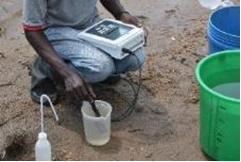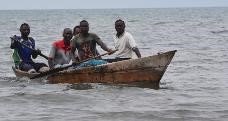 VLIR-UOS, South Initiative: surveillance de la dynamique de la biodiversité du Lac Tanganyika (closed)
VLIR-UOS, South Initiative: surveillance de la dynamique de la biodiversité du Lac Tanganyika (closed)
| Release date | 09/11/2017 |
|---|---|
| Contributor | mlsusini |
| Geographical coverage | Burundi |
| Keywords | biomonitoring, pollution |
- VLIR-UOS South Initiative
- The promotor in Belgium is Prof. Ludwig Triest (Vrije Universiteit Brussel), and in Burundi, Prof. Joël Ndayishimiye (Université du Burundi).
- Duration: 2015-2016
- Budget: 75,000 Euro
- Co-promotors: Dr. Luc Janssens de Bisthoven (CEBioS) and Benoit Nzigidahera (OBPE, Burundi)
The rationale of the project stems from a demand by the ‘Office Burundais pour la Protection de la Nature (OBPE)’ to install a rapid and effective biomonitoring system of the Burundese part of the coast of Lake Tanganyika, based on scientific evidence of the value of riparian habitats as hatching and nursery ground for pelagic fish, important for the local artisanal fisheries and hence as a source of income and protein for local communities. In order to install such a surveillance system, the multidisciplinary team focuses on eight littoral habitats with a variable degree of anthropogenic stress, distributed along the Burundese shoreline. The team explores both the water physico-chemistry, and a range of taxa to be used as bioindicators: algae, macrophytes and macro-invertebrates. Also the fish fauna of these habitats is inventoried. The lake suffers from pollution by the city of Bujumbura and artisanal palm oil processing, input by small streams with loads of sediments from erosion due to deforestation and overfishing by catamarans with light fishing of sardines at night and mosquito nets.
Moreover, the ‘Centre de Recherche en Hydrobiologie’ of Uvira in DR Congo was invited for a fruitful brainstorming with the colleagues from OBPE and Université du Burundi to explore transfrontier avenues of cooperation to better understand and monitor their common lake resources in a sustainable way.


 This site uses cookies in order to function as expected. By continuing, you are agreeing to our
This site uses cookies in order to function as expected. By continuing, you are agreeing to our 




